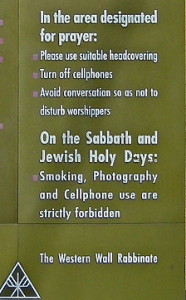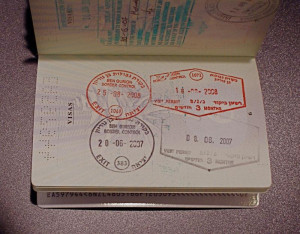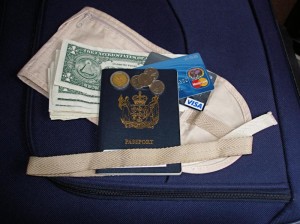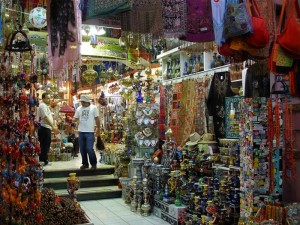Money: Countries and currencies
Business hours
Business hours and weekend closures in the Middle East are different from those in the Western world.
In Israel and Palestine, most Jewish businesses are closed on Friday afternoon and Saturday (Shabbat); Muslim businesses on Friday; Christian businesses on Sunday. Shabbat begins at sunset on Friday, when all public transport operated by Jews ceases until sunset on Saturday.
In Egypt, government offices and banks are closed on Friday and Saturday but some government workers have Thursday and Friday off.
In Jordan, government offices, banks and most businesses are closed on Friday and Saturday.
In Muslim areas of the Middle East, working hours are reduced during the month of Ramadan.
Communication
For mobile phones, your service provider can advise about international roaming. Other options are to buy or rent a local SIM card, or rent a phone, on arrival in each country.
If you take a mobile phone, you will also need a charger (and a transformer if the charger cannot handle 220 volts).
Documentation
Make sure your passport will not expire until at least six months after you return home. You may also need a pre-arranged visa. Travel agents often arrange visas for group members, but here is a general guide:
Israel and Palestine: Visitors from most Western countries do not require a pre-issued visa. Israel has diplomatic relations with Turkey, Egypt and Jordan, but most other Middle East countries and some Muslim countries (such as Malaysia) may refuse entry to anyone whose passport indicates they have visited Israel. Because of this problem, Israel no longer stamps passports but instead issues a separate entry card.For anyone planning to visit one of these countries, crossing from Jordan to Israel can still present a problem. A Jordanian stamp at the border crossing is still evidence of entering Israel. The solution is to ask Jordanian border officers (both entering and leaving) not to stamp the passport.
Egypt: Short-term visitors from most Western countries can obtain a visa on arrival, or in advance from an Egyptian embassy. A passport photograph is required. For travellers entering Egypt via South Sinai and remaining in the South Sinai resort area, a free 15-day visa can be obtained on arrival.
Jordan: Short-term visitors from most Western countries can obtain a visa on arrival (except at the Allenby/King Hussein bridge crossing with Israel), or in advance from a Jordanian embassy. A passport photograph is required. Groups of five persons or more arriving through a designated Jordanian tour operator are exempted from all visa charges.
In case documents get lost or stolen, photocopy the first two pages of your passport, airline tickets and travel insurance details. Leave one copy with a friend at home and take the other with you (separate from the originals) or give it to a friend who is travelling with you.
Etiquette
Dressing and acting in a manner that shows respect for the host country’s social and cultural values should be the pilgrim’s aim.
Some social rules to be aware of in the Middle East are:
• Avoid public displays of affection between people of the opposite sex.
• Don’t display the sole of your foot or touch anyone with your shoe.
• If you are offered a show of hospitality, whether it is coffee or tea or something more lavish, it is considered discourteous to decline.
• During Ramadan, the month when Muslims fast from dawn to sunset, eating or drinking in public in Muslim areas during the fasting hours should be avoided.
• While it is difficult to visit the Middle East without being aware of political tension, pilgrims are wise to refrain from expressing opinions about it in public. Feel free to ask questions of the people you meet, but be aware that the answers you get will differ considerably, depending on the person you are talking to.
Food
Nutritious breakfasts and ample dinners are usual in tourist hotels in the Middle East, though pilgrim hostels offer simpler fare. Seasoned travellers usually eat a hearty breakfast, and perhaps take a piece of fruit to eat at lunchtime (if lunch is not being provided).
Falafel, a fried ball or patty made from chickpeas or fava beans, is common lunch fare.
Outdoor markets may be tempting, but avoid uncooked, undercooked or reheated food; raw fruit or vegetables (unless they can be peeled or you wash them first); ice cream (except for internationally packaged and labelled brands); dairy products; shellfish; food that has been exposed to flies; or dishes that require a lot of handling to prepare.
Some pilgrims bring snack foods to eat on the bus when they are travelling.
Regular intake of liquids is essential to avoid dehydration. While the tap water in hotels is usually safe, bottled water is sold everywhere, and should taste better (but check that the seal is unbroken). Canned drinks, including beer, are low-risk, but avoid ice in drinks.
For the flight
Get your packing done early so you can rest for a day or two before leaving, especially if you are travelling to the Holy Land from the other side of the world.
Wear comfortable clothing. Avoid anything that is tight or restrictive.
On the flight, drink plenty of water but go easy on coffee or alcohol. Don’t eat more than you need.
Be sure to get some exercise. Walk up and down the plane occasionally or exercise the muscles of your lower legs, swirling your ankles around from time to time to keep the blood circulating. Graduated compression flight stockings sold by pharmacies are recommended for long flights.
Deep-vein thrombosis can be caused by a long period of immobility in cramped seating, combined with dehydration and reduced oxygen pressure at high altitudes.
Try to sleep on long flights. Close the blinds, wear an eye mask and ask for a pillow.
When you arrive at your destination, sleep according to the local time.
Health
No vaccinations are required to visit most tourist destinations in Israel, Palestine, Egypt or Jordan.
If you haven’t seen your dentist in ages, a check-up might avoid toothache on the trip.
If you are on regular medication, bring enough for the whole trip and carry at least a week’s supply in your cabin bag. Bring a copy of a prescription, or a doctor’s letter, as well. Medication should preferably carry pharmacy labels.
Wherever you go, be meticulous with personal hygiene. Wash your hands or use handwipes before eating.
Money: Countries and currencies
ISRAEL: The new Israeli shekel (NIS) is divided into 100 agorot. Foreign currency (especially United States dollars or euros) is usually accepted, though change will often be given in shekels.
Paying in foreign currency on items such as accommodation and car rental avoids Value Added Tax of 17%.
ATMs are widespread and credit cards are widely accepted, but pilgrims’ hostels usually require payment in cash.
EGYPT: The Egyptian pound (E£) is divided into 100 piastres.
ATMs are common in main cities, though not in small towns. As in other countries in the region, ATMs offering US dollars are not common. Credit cards are widely accepted in tourist-friendly establishments, but not in budget hotels and restaurants.
The Lonely Planet Middle East guide advises against accepting shabby or defaced notes from money changers, as they are difficult to offload. Low-denomination notes, useful for tips, taxis and places which do not have correct change, are hard to come by.
JORDAN: The dinar (JD) is divided into 1000 fils (a “piastre” is 10 fils).
ATMs are common except in the smallest towns. Credit cards are accepted in top-end hotels and restaurants and some shops.
Some foreign currency (US dollars, UK pounds and euros) is accepted in cash.
To keep track of what local prices are worth in your own currency, the Oanda.com website listed below has a useful “cheatsheet” facility.
Money: What to take
A mixture of cash, credit card and debit card is advisable for visiting the Middle East. It can be useful to take some local currency for each country, for use on arrival, but US dollars are universally accepted.
How much should you take? That is very much related to personal spending habits. Prices in the Middle East are generally less than in Western countries, with the exception of Israel and Palestine.
Group pilgrimages may not include lunches. You may also want to buy incidental food items, bottled water, or drinks at dinner. Then there are holy items, souvenirs or camera batteries. And there will always be a demand for tips (see below).
Keeping a supply of $US1 notes handy is useful for tips, bottled water and other small purchases.
Using a debit card reduces the need to carry large amounts of cash. You simply load the card with cash before you leave home, then make cash withdrawals from ATMs as you need more money. (Unlike cash withdrawals from credit cards, these are not charged interest.)
Some banks now offer traveller’s cards that offer credit and debit functions.
It is wise to take more than one card and keep them in separate places. Your cards should have a PIN code and they should be valid for at least 30 days after your travel ends.
Changing currency is usually cheaper at official exchange offices (which charge no commission) than at banks.
Photography
If you use a digital camera, take several memory cards rather than one big one (then, if your camera is lost or stolen, you won’t lose all your pictures).
If your camera uses film, take plenty with you as it may be more expensive overseas. Also take spare batteries.
If you use rechargeable batteries, you will also need a charger (and a transformer if the charger cannot handle 220 volts).
Photography (or the use of flashes) is prohibited in some sites, for copyright reasons or to protect art.
Use discretion in what you photograph. Taking pictures of military personnel or facilities is often forbidden. Don’t take close-up photographs of Muslim women with covered faces or Orthodox Jewish men or women without first asking.
Security: Personal
A few common-sense precautions can avoid risks to personal safety.
1. Keep a low profile. Don’t stand out in dress, speech or behaviour. Especially avoid wearing anything that identifies you with one side or the other in Middle East politics.
2. When exploring on your own, go in pairs or groups. Stay away from public demonstrations and crowds.
3. Keep your eyes open. As Charles H. Dyer and Gregory A. Hatteberg say in The New Christian Traveller’s Guide to the Holy Land, “Don’t become so absorbed by the grandeur of the sites that you fail to keep track of what is happening around you. If you sense anything out of the ordinary, don’t hesitate to express your concern to the tour guide or tour leader.”
4. Take special care when crossing the street, especially if traffic drives on the opposite side to what you are used to. Allow for bad driving and reckless speeding; and, in some areas, drivers not using lights at night.
The Lonely Planet Middle East guide says: “It may sound silly, but the greatest challenge most travelers face when travelling through Egypt is crossing the street in Cairo . . . . Position yourself so that one or more locals form a buffer between yourself and oncoming traffic, and never hesitate once you’ve stepped off the sidewalk. And do it fast.”
Security: Valuables
Carry your valuables close to your skin, in a money belt, pouch or inside pocket. Keep cash and credit cards separate.
Keep your money, credit cards and passport on your person or in the hotel security box.
Avoid using an Internet café or hotel computer to access your bank account. It is better to operate your account on your mobile phone or ask someone at home to do it, giving instructions by email or phone.
Outside pockets and handbags make easy pickings for pickpockets and bag snatchers, especially in crowds.
Remember to collect your valuables from the safe before you leave each hotel.
Do not wear conspicuous jewellery or flash large amounts of money.
Don’t leave bags unattended in airports or other public places, and don’t accept packages from strangers.
Israeli airport security is second to none. Lengthy personal questioning and baggage searches can be expected, especially on departure (Where did you go? Who did you talk to?) Be patient and co-operate, and resist any temptation to joke about explosive devices.
Be wary of scams, especially in Egypt. If anyone (even looking like an official) tells you your hotel booking is cancelled, ignore him; it will be a scam to get you to another hotel.
Shopping
An essential part of experiencing Middle Eastern culture is bargaining with traders and shopkeepers. It is expected by merchants — and it is necessary to get a realistic price.
Haggling over prices is a time-honoured form of social interaction. Consider Proverbs 20:14: “ ‘Bad, bad,’ says the buyer, then goes away and boasts.”
Here are some rules of the game:
• Prices are more expensive in tourist areas than in residential shopping areas.
• Be wary of locals who are paid a commission to take you to a “cousin’s” shop.
• Offers of tea or sweets are intended to lull you into buying.
• For expensive items, know how to check authenticity and quality. Otherwise buy in fixed-price shops, which might have better quality. (Or at least check prices in fixed-price shops.)
• Be cautious about the claimed quality or provenance of items.
• Don’t appear too anxious to purchase an item.
• Never accept the first price. Often an item in a bazaar can be purchased for less than half of the asking price (or in Jordan, for 20-25% less).
• Let the shop owner start the bidding.
• Don’t make an offer for anything you are not willing to buy.
• Buying more than one item from the same shop may get you better prices.
• Respect the salesman. Don’t imagine you can outsmart him. He is a master in the art.
• Always be ready to walk away if you don’t like the price; most items are available in many shops.
• Be polite and keep your sense of humour.
• Always keep in mind what the money means in your home currency.
• Keep things in perspective. Remember that the trader has to make a living, while all you may be doing is trying to save a dollar.
• If you are buying several items, keep a note of the details in case you need them for customs officers when you arrive home.
• Don’t let the lure of bargains distract you from the purpose of your pilgrimage. In particular, be wary of being hustled into expensive shops by tour guides who get kickbacks.
Time and orientation
The time in Israel, Palestine, Jordan and Egypt is two hours ahead of Greenwich Mean Time and seven hours ahead of Eastern Standard Time in North America.
All four countries have daylight saving time, which lasts from approximately March to September (early April to end of October in Syria).
Pilgrims from the southern hemisphere have an extra reason to be disoriented in the Holy Land: The sun is to the south, rather than to the north as they are used to. As one faces the sun, it rises on the left and sets on the right.
Tipping
Tipping in varying degrees is expected in all Middle Eastern countries. Pay scales are much lower than in the West, so tipping or “baksheesh” is often necessary for waiters and hotel staff to gain a liveable wage.
A supply of small change (such as $US1 notes) is handy for this purpose.
Egypt: In restaurants a service charge is automatically added, but waiters expect an extra 10% tip. Taxi drivers generally expect 10% unless the fare has been agreed in advance. Demands of tips for inconsequential services are common.
Jordan: Tips of 10% are expected in restaurants (and may be added to the bill). Similar tips for waiters and taxi drivers are appreciated.
Israel: Restaurants expect 10-12% (sometimes already added to the bill). Taxi drivers don’t expect tips.
Travel insurance is essential. Read the policy details so you know what to do in the event of ill health, injury or theft. Keep receipts for any expenses that you may wish to claim.
Travel insurance policies may exclude coverage in countries (or regions of countries) that are deemed to pose more than the usual risks. If in doubt, check with your insurer before leaving home to confirm that you are covered. Practice can differ from company to company.
External links
Holy Land sites
Christian Information Centre, Jerusalem
Franciscan Custody of the Holy Land: Christian sanctuaries
BiblePlaces.com: Photos and descriptions of biblical sites in Israel Jordan, Egypt, Turkey and Greece
Israel Ministry of Tourism
Travel Palestine
Egyptian Tourist Authority
Jordan Tourism Board
Currency conversion:
OANDA, the Currency Site
OnlineConversion.com
Government travel advisories:
Australian Department of Foreign Affairs and Trade
Canadian Department of Foreign Affairs and International Trade
New Zealand Ministry of Foreign Affairs and Trade
United Kingdom Foreign and Commonwealth Office
United States Department of State





